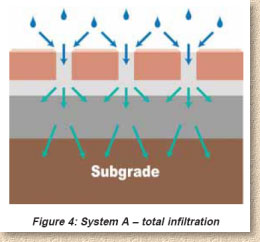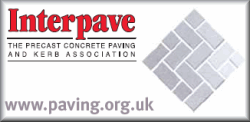Permeable Paving - latest thinking
There can be no doubt that permeable paving is the hottest of hot topics in the paving industry at the moment. Hardly a week goes by without some under-informed hemi-demi-semi-celebrity wastes valuable newspaper or Sunday Supplement space with some self-serving twaddle about how the paving of front gardens for off-road parking is the biggest threat to the environment since Noah started his boat-building business. Let's be realistic: motor insurance is now hovering just below the price of a new car, and many insurers offer a not-to-be-sniffed at premium reduction if you have a garage or driveway parking. Combine this with the fact that many people are far too busy to spend time tending to a front garden that is little more than a vegetated gap between the road and the house, and if we want to loll about in our skimpies during the warmer weather, we do it in the back garden, and not on the front where the perv from across the road will be eying up our kids. So, all of this leads to more and more front gardens being turned over to off-road parking.
To be fair, the environmentalists do have a point about how conventional paving prevents precipitation reaching the ground and instead, we're sending millions of litres of clean water to the already overwhelmed sewers. What far too many of these concerned citizens fail to point out is that there are paving systems that can provide firm footing, good looks, property value enhancement AND allow the rain, hail, snow and ice to reach those parched aquifers without ever seeing the inside of a main sewer. Say hello to Permeable Paving.

As the trade body for several of the big national (and international) paving manufacturers, Interpave is leading the way in promoting awareness of permeable systems for every type of application, from retail centre car parks to individual driveways and patios, and to this end, they have just published a series of documents that consider various options, strategies and ramifications of using permeable paving systems (PPS) and they are available to download, completely free of charge, from the Interpave website.
There's an unfounded wariness regarding PPS, especially amongst contractors. The concept of sending surface water into the pavement, when they've previously spent their entire working life keeping water out of the pavement structure, comes as something of a shock to many of us, and when we see the no-fines material intended to be used for the sub-base and laying course, many of us start to panic because it runs counter to everything we've assumed about compaction and serviceability. This scepticism and uncertainty is largely due to unfamiliarity, and to counter this, the Hard Landscape Training Group , in association with Interpave and yours truly are hoping to run a series of PPS Awareness courses over the coming year, to introduce contractors and designers to the benefits of PPS and to give them a better understanding of just how PPS are constructed, and, just as importantly, how they shouldn't be constructed.
Keep your eye on this website for updates on where and when, but in the meantime, do yourself a favour, click on over to the Interpave website and download these latest documents to get yourself up-to-date with current thinking and best practice.
" PERMEABLE PAVING AND THE LAW Implementing Planning Law, Policy, Building regulations, Government Guidelines and Adoption".
" RESPONSIBLE RAINWATER MANAGEMENT AROUND THE HOME Using precast concrete paving."
" CONCRETE BLOCK PERMEABLE PAVEMENTS Guide to the Design, Construction and Maintenance of CBPP - edition 4.



